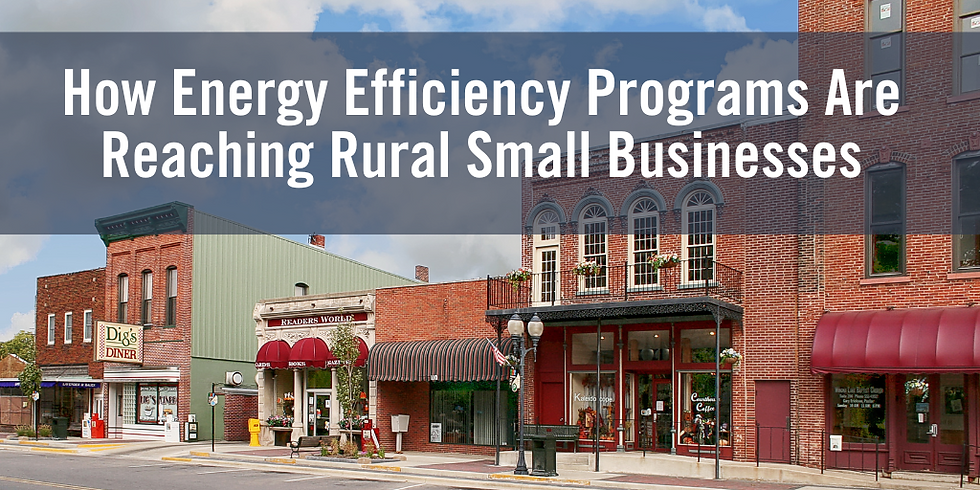How Energy Efficiency Programs Are Reaching Rural Small Businesses
- Aug 20, 2025
- 3 min read

Written By: Rob Hall
In rural America, small businesses and small agricultural producers are vitally important to the nation's economy. Yet, given their remoteness and low operating margins, they often grapple with high energy costs and have limited access to capital for improvements to implement energy efficiency improvements. To address these issues, various federal, state, and utility programs aim to increase access to energy efficiency opportunities and funding.
At the Federal Level
Rural Energy for America Program (REAP) is cornerstone of rural energy efficiency initiatives and administered by the U.S. Department of Agriculture (USDA). Enacted as part of the 2002 Farm Bill, REAP provides grants and loan guarantees for both small agricultural producers and rural small businesses installing renewable energy systems and energy efficiency improvements. These entities may be eligible for grants ranging from $1,500 to $500,000 and loan guarantees up to 75% of total eligible project costs.
REAP has enabled numerous projects across the country. For instance, in Vermont and New Hampshire, 17 small businesses received over $1.26 million through REAP to implement energy efficiency measures. Among these recipients, Boyden Valley Winery in Cambridge, Vermont, was awarded a $12,989 REAP grant to purchase and install energy-efficient heat pumps. This upgrade is projected to save the winery approximately 28,400 kilowatt-hours annually, translating to about $1,000 in yearly utility bill savings.
At the State Level
The Oregon Department of Energy's Rural & Agricultural Energy Assistance Program offers funding for energy assessments, covering up to 75% of the cost. These assessments help rural small businesses and agricultural producers identify cost-effective energy-saving measures.
In North Carolina, Waste Reduction Partners (WRP) also offers energy efficiency assessments to rural small businesses and farms, identifying cost-effective energy-saving measures. Valued at $1,300, the assessment funding is provided by the USDA REAP program; these assessments include utility bill analysis and surveys of major energy-using equipment, often identifying opportunities to save 10-20% on energy bills.
At the Utility Level
Utilities and electric co-ops can play a significant role in promoting and facilitating energy efficiency in rural communities. The San Isabel Electric Association in Colorado, for example, received a $100,000 REAP grant to assist rural small businesses in obtaining energy audits. These audits identify potential energy improvements, and businesses can apply for REAP grants to implement recommended measures.
Similarly, the Orcas Power and Light Cooperative (OPALCO) in Washington state provides energy audits and facilitates energy efficiency projects. Through the "Energize the San Juan’s Program" OPALCO offers customized energy action plans and access to rebates and financial incentives.
At the Local Level
Energy Trust of Oregon has implemented a successful strategy by partnering with local organizations (called “Community-Based Organizations”, or CBOs) and community leaders to offer no-cost lighting upgrades to small businesses. Outreach managers like Karen Chase in Southern Oregon have conducted door-to-door campaigns, directly engaged business owners and facilitated immediate energy assessments and installations. This approach has led to significant participation, with 474 out of 773 lighting projects in 2023 occurring outside the Portland area, many in rural communities.
Local chambers of commerce also play a vital role in facilitating energy efficiency initiatives. By serving as intermediaries between small businesses, lenders, and energy program providers, chambers can connect members to resources and support which helps them understand the business case for energy improvements and navigate the clean energy landscape.
Current Challenges and Looking Ahead
Despite the successes of the above programs, rural small businesses still face challenges. Uncertainty about current funding may impact the future of energy efficiency programs, particularly in rural areas. A freeze on federal loans and grants in early 2025 has created turmoil for rural business owners who had invested in clean energy improvements, anticipating rebates through REAP.
Nevertheless, the commitment to energy efficiency in rural America remains strong. Programs like REAP, state-level initiatives, and collaborative efforts between utilities and cooperatives continue, for now, to empower rural small businesses and agricultural producers. By reducing energy costs, these programs not only enhance the economic viability of rural enterprises but also contribute to broader environmental goals.
Contact us at info@waypoint-energy.com to learn more information about improving your Rural Program Design, Implementation, & Outreach with your utility. Learn more about our utility services here.





Comments